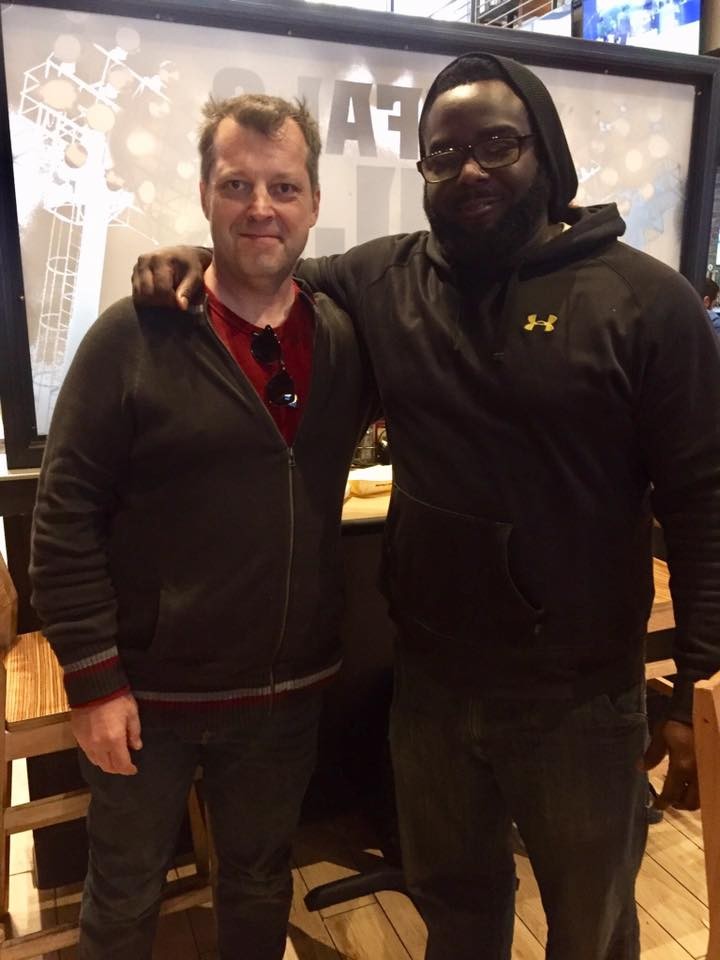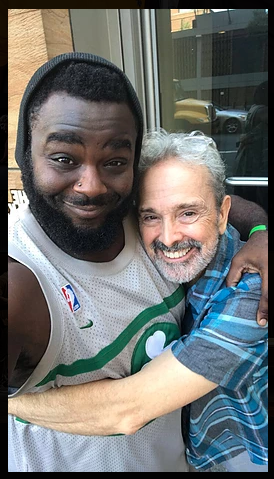 Our awesome server
Our awesome server
Hanging with Harold Foxx
The Old Testament character Job had his share of problems. He lost his home, his livelihood, his health, and his family. Craig Lucas’ play I Was Most Alive With You, which recently took its last bows at Playwright’s Horizons, may borrow heavily from the troubling Bible story, but none of that tragedy’s rubbed off on Harold Foxx. The Memphis-born actor may have made his Off Broadway debut in Lucas’ Job-inspired play, but he looks like a man on top of the world. Sitting in the Buffalo Wild Wings on Manhattan’s W. 47th (“the one close to Playwright’s Horizons”), Foxx’ broad face practically glows with confidence.
“Did you see my New York Times spread,” he asks by typing the words out on his phone and holding it up for me to see. I indicate that I have and tell him it looked great. He then types out a message saying he’s waiting to see if the attention results in more work. If it does, he’ll get excited about it.
Foxx is realistic about life as a working actor. He grew up in Orange Mound and graduated from White Station where he played football and made citywide headlines. Foxx is completely deaf. He’s mostly silent. He’s currently a professional actor, who lives in Los Angeles where he studies improv comedy with the Groundlings and auditions as often as possible. He doesn’t think a Netflix special is out of the question. There’s no reason to believe he won’t get a shot at being in the next Black Panther movie. Nothing’s for sure, but Foxx believes. He points to his personal inspiration, the deaf actor C.J. Jones who recently made his film debut in Edgar Wright’s Baby Driver.
“My agent’s good,” he types.
 Courtesy of Harold Foxx
Courtesy of Harold Foxx
Harold Foxx and Craig Lucas
Foxx is as expressive as any silent film star. Every wrinkled brow or nostril flare writes a whole new story on his face. He describes this expressiveness as an artifact — something that just happens when you’re in the deaf community. But there’s precision to every eye-roll or pursing of the lips. There’s timing, and it’s good. You don’t always need to read ASL to get the gist of his messaging. Critics noted his skills in I Was Most Alive With You, where the play’s main speaking characters are mirrored by a shadow cast who perform a somewhat modified version of the show in ASL.
I caught up with Foxx in Manhattan, during the last week of his run at Playwright’s Horizons. We “talked” about many things over wings, but did our official Q&A in a typed format. Here’s a lightly edited version of that conversation.
Memphis Flyer: Wondering about life in Memphis. Did you know you wanted to act and do comedy when you were still living there?
Harold Foxx: Born and raised in Memphis. Native of Orange Mound. It’s funny how my comedy starts. Every morning the school bus picked me up. It was sorta of long ride. Then one day all of us kids on the bus just start to making jokes. From there I started doing comedy storytelling. That was in elementary school. And everybody laughs. Then, after school, when the bus takes us back home, everybody asked me for another comedy storytelling. And I start doing it again. Then somehow it became daily on the school bus, on the way to school and after school. Only difference is that I didn’t get paid that time. Since then, everybody sees my talents. Not only in comedy, but in acting too. Even my teachers in elementary school got me in school talent shows for dance and sign music. Plus, when I was in elementary school, the national theatre for the deaf came to my school and performed for us and I really looked up to them. Not only that. My former theater teacher Rita Grivich, who runs Deaf Drama & Theatre at White Station, always had a show. And when I was young, I’d always go there and watch the older kids perform. And I knew it would happen for me someday and glad that I was part of it.
MF: Memphis only has limited opportunities for actors, and the comedy scene has only begun to mature in the last few years. Guessing Paulette Reagan was a theater teacher at White Station? Were there many opportunities to experience and participate in comedy or theater?
Yes, Paulette Reagan and Rita Grivich were my theater teachers at White Station. Honest with you, I’m thankful to have had them as my teachers at White Station. When I was there, I was heavily involved in theater and it actually helps. It applies to what I’m doing today as an actor.
MF: When did you decide on comedy and acting as a career? And was there an obvious path for deaf performers or did you have to make your own?
Actually with all my experience and background as an actor from White Station High school under Paulette Reagan and Rita Grivich, they taught me a lot on what it takes to be an actor. When I graduated from White Station in 1999, I went to Gallaudet University in Washington, D.C., where I graduated and also played college football there. Everybody expected me to join the theater at Gallaudet University but I didn’t get involved in theater productions. I focused on football. But I took a couple of theater courses at Gallaudet. So, when I graduated, I started to work as a football coach, personal trainer, and physical education teacher. Somehow my acting passion hits me again one day and I started doing some comedy sketches on Vine apps. It changed my whole life. Now I’m doing acting/comedy as a career, full time. Most of all I started this out on my own from looking up to my role model like CJ Jones, John Maucere, Redd Foxx, Richard Pryor, Chris Rock, Jamie Foxx, etc..

Past show flyer
MF: I love silent film, and your comedy reel was a joy to watch because it has the expressiveness of great silent comedy. Funny enough to transcend any biases hearing audiences might have. Curious as to which actors and comics might have inspired you?
I started on Vine Apps. Of course, as deaf person, I can’t hear a sound or music. Most of my sketches were based on body language and physical comedy so it can be accessible to both hearing and deaf audiences. It started similar to silent film — like my favorite comic who did all amazing in silent film, Charlie Chaplin. Then I started my internship at DPAN.TV (Deaf Professional Arts Network) where I learned to make better quality work — script, film, edit. Plus, they have a sound engineer who installs all sounds and music. My comedy video went to a whole different level. That’s when I started getting recognized for my work and getting opportunities in acting and comedy.
MF: How did you land the role in I Was Most Alive With You? And was working on it like anything you’ve done before? Looking at the behind-the-scenes videos, the process looks like it must have been unique and difficult.
Yes. It’s different from what everybody’s already seen from my work as a comedian or doing sketches on the video. I was in a production of Our Town last year by Pasadena Playhouse and Deaf West Theatre. That’s where everybody recognized my work on stage in theater. I’m not only limited to comedy. I can do variety range of work as an actor. Actually how did I land the role? I was in Jamaica doing stand up comedy and then I got an email from my agent. They asked for my video audition, but at that time I wasn’t really interested because I didn’t want to move to NYC. I’m still new in LA. Then one friend convinced me. Said, “It’s Off Broadway.” And that’s a good start for my career. So I decide to do the video audition and I got offered the job. So, I’m thankful for this opportunity because I got to work with amazing talented of actors and actresses plus Craig Lucas and Tyne Rafaeli.
MF: Do you think the show’s accurate in its depiction of hearing impaired people, and culture?
We do both as English spoken and ASL, it’s a very heavy play and powerful at the same time and it’s very accessible to both audience.
MF: Has the run been rewarding? And is it difficult to put away as closing night approaches?
We had a very successful run, but at the same time we wish it could be extend more.
MF: Has the run of this show resulted in more opportunities, or is it back to the audition grind?
I’m hoping this production will get me more opportunities. I mean, it’s not easy as deaf actors/actresses because we don’t get a same opportunity as hearing actors/actresses. They might get an audition daily when we, as deaf actors and actresses, are probably lucky to get 2 or maybe 3 auditions a month. But for me, it’s all about hustling. Show your work out there and create your own work. That’s why I created a bunch of short comedy sketches. Now I’m writing my new stand up comedy material and working on a film script. Who knows, I might produce a feature film and act in it someday instead waiting for someone to offer me the opportunity. Always have your own work ready to go.
Memphis Actor/Comedian Harold Foxx Makes Off-Broadway Debut
MF: I know you’ve been training with The Groundlings — which is great! But wondering what’s next, and if you have a preference for sketch/standup over other kinds of performance?
Right now I’m still in training and taking classes at the Groundlings. Sometimes I put it on hold if I get an opportunity like Off Broadway in NYC. But now my agent and I are working on something. Be aren’t sure yet. But for the Groundings, my training continues. Who knows? Maybe one day I will end up on SNL or Comedy Central.
MF: Do you ever make it back to Memphis? What’s the best way for folks back home to experience what you do?
I finally made back to Memphis last summer after seven years. I did a homecoming standup show there and am hoping to do it again soon. Memphis is my hometown, roots, and where I started. One thing I would tell Memphis folks, if they are pursing what I’m doing, it starts with passion and hard work. Create your work and get some training with a top acting or improv class to develop some network.
Click here for more on Harold Foxx